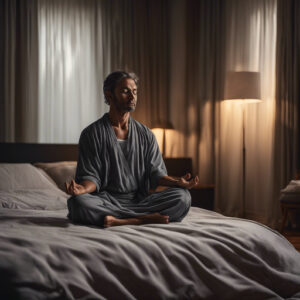Tips to help you sleep better
If you have difficulty sleeping, you understand the frustration of lying awake at night, gazing at the ceiling and anxiously waiting for morning to arrive. If this resonates with you, rest assured that you are not alone. Insomnia affects a staggering number of individuals each year, with a significant portion of the population in America experiencing its effects. Fortunately, there are several effective strategies you can employ to enhance the quality of your sleep. Some can be easily incorporated into your daily routine, while others require more dedication. However, ensuring a restful night's sleep will make your efforts worthwhile. Now, let's get started.
Regular exercise
Dealing with insomnia can be incredibly frustrating and can have a significant impact on your daily life. If you have difficulty achieving a restful night's sleep, you may experience grogginess and irritability throughout the day. Surprisingly, there is a straightforward solution: exercise. Regular exercise can significantly improve your sleep quality, allowing you to fall asleep faster and enjoy more extended periods of uninterrupted rest. Regular exercise has been shown to have numerous benefits for sleep, including improved sleep quality, increased energy levels, and reduced stress. Just 30 minutes of exercise each day is all you need; spending hours in the gym is unnecessary. In addition, regular exercise can help regulate your body's natural sleep-wake cycles. Even a light workout can have a significant impact. It is essential to maintain a regular exercise routine to reap the benefits.
In addition, incorporating regular exercise into your routine can significantly benefit your overall health and well-being. It's important to avoid exercising too close to bedtime, as it can stimulate the brain and release endorphins. While it may provide a sense of satisfaction, it won't improve your ability to fall asleep.
Avoid caffeine and alcohol before bed to improve sleep.
Consuming caffeine or alcohol before bed is a common trigger for insomnia, as it can disrupt your sleep patterns. It's essential to be aware that caffeine is a stimulant that can interfere with falling asleep and lead to frequent awakenings throughout the night. This occurs because it inhibits the release of adenosine, a naturally occurring chemical that promotes drowsiness. One possible reason for experiencing difficulty falling asleep after consuming a caffeinated beverage is its impact on our body's natural sleep-wake cycle.
Contrary to popular belief, alcohol may initially help you fall asleep, but it can disrupt your sleep later in the night, causing restlessness and disturbances. For optimal sleep quality, consuming non-caffeinated and alcohol-free beverages in the evening is advisable.
Avoid screens before bedtime.
Screen time before bed could be a potential factor affecting sleep quality. Research has indicated that the intense light emitted by electronic screens, such as televisions and other devices, can disturb our natural sleep-wake cycles, posing challenges in initiating sleep. Moreover, the blue light emitted by these devices can significantly disrupt our sleep cycles.
Please refrain from using your phone.
For better sleep quality, consider reducing your screen time in the evenings. Consider keeping your mobile phone in a different room at night and refraining from watching television an hour before bedtime. If neither of those options interests you, you can use blue-light-blocking apps on your phone or wear blue light-blocking glasses.
Try relaxation techniques before bedtime.
To enhance your sleep quality, consider incorporating activities like reading a book (preferably not on a screen), indulging in a soothing bubble bath, or enjoying some cosy moments with your partner before bedtime. These activities are known for calming effects, helping you unwind and relax. A consistent night-time routine can significantly prepare your body for a restful sleep.
Create a consistent pre-sleep routine.
Establishing a consistent bedtime routine can profoundly impact your sleep quality. It is essential to establish a consistent bedtime routine, which may include indulging in a relaxing bath. It is also advisable to establish a consistent wake-up time. This also includes weekends and days off. Initially, you may find it challenging, but once you establish a consistent routine, you'll be amazed at the significant improvements it can make to your sleep.
Use apps to help you sleep.
At times, falling asleep can be challenging when one is preoccupied with anxiety or concerns. If you find it difficult to count sheep or unwind alone, using an app could be helpful. One practical approach is using a meditation app like Headspace or Balance. These guides will guide you through practical strategies, helping you achieve a restful night's sleep in no time.
Consider exploring white noise or binaural beats apps for a more professional approach. These can help redirect your attention from your concerns and provide a calming background ambience.
Your bedroom should be relaxed, dark, and quiet.
Creating the ideal bedroom environment is essential for a restful night's sleep. This involves ensuring that the room is cool, dark, and quiet. These factors play a crucial role in promoting deep and rejuvenating sleep. For optimal deep sleep, it is recommended to maintain a bedroom temperature of approximately 60⁰F. Ensuring proper ventilation in the bedroom is essential for maintaining a cool and comfortable sleep environment. Open a window to let in some fresh air. This enhances the sleep-friendly atmosphere.
In addition, a dark room creates the ideal environment for optimal melatonin production and minimises distractions caused by external light sources. Investing in black-out blinds can help create a darkened room for optimal sleep conditions. Lastly, ensuring a quiet and distraction-free environment in your bedroom can significantly enhance the quality of your sleep. Using earplugs can effectively block out any noises, including the sound of a snoring partner. By implementing these strategies, you can rest assured that you'll be able to drift off to sleep more quickly and enjoy a peaceful night's rest without any interruptions.
Go camping
There are numerous effective methods to alleviate insomnia. However, camping is a highly effective and enjoyable option. Camping offers a range of unique qualities that contribute to a peaceful and rejuvenating sleep experience. Spending time outdoors in nature has been proven to positively impact mental health, reducing feelings of stress and anxiety. When campers escape the distractions of modern technology and other urban conveniences, they can gather around the campfire and enjoy uninterrupted conversations without concerns about the adverse effects of blue light or EMFs.
Reset your sleep/wake cycle.
Being in nature can effectively reset your circadian rhythm by exposing you to natural daylight and the natural cycles of light and dark. Exposure to sunlight in the morning can significantly impact your sleep/wake cycle, leading to better sleep and a refreshing start to your day. Whether it's an extended backpacking trip or just a day hike with your family, a camping trip can provide the ideal opportunity to achieve restful sleep and overcome insomnia.
Numerous effective methods exist to alleviate insomnia, such as incorporating exercise into your routine, ensuring proper ventilation in your bedroom, engaging in regular physical activity, or even enjoying a camping getaway. Consistency is key to overcoming insomnia. Stick with your chosen method and bid farewell to sleepless nights.
The Article: Discover Tried and Tested Techniques to Achieve Quality Sleep Appeared First On Upton-upon-Severn Nutritionist.
The Article: Find Proven Sleep Methods appeared first on Jane Stevens.
The Article Find Proven Sleep Methods Was Found On https://limitsofstrategy.com


ercise. Incorporating regular physical activity into your routine might just be the game-changer you need. When you work out, your body releases endorphins, which not only boost your mood but also help regulate your sleep patterns. You don’t have to hit the gym like a bodybuilder or run marathons; even a brisk walk in the evening or some light yoga can do wonders. As your body tires out from movement, it signals to your mind that it’s time to wind down, making it easier to fall asleep.
You brought up some really important points about exercise and its impact on our overall wellbeing. I’ve found that even just fitting in a short walk or some stretching can change my mood significantly. It’s interesting how our bodies and minds are so interconnected; I’ve noticed that when I make it a habit to move, I feel more in tune with my body and more relaxed at night.
It’s really fascinating how just a little movement can shift our mood, isn’t it? I totally agree that those small acts, like a quick walk or some gentle stretching, can make a big difference. It’s almost like our bodies are constantly communicating with us, and being active helps us tune into what they’re trying to say.
You make a great point about incorporating physical activity into our routines. I’ve personally found that even a short evening walk can help clear my mind after a long day. It’s interesting how something as simple as movement can have such a multifaceted impact on both our physical and mental well-being.
You make such a solid point about the impact of regular physical activity. I’ve definitely felt the difference when I incorporate even just a little movement into my day. Lately, I’ve been trying to make it a habit to go for a walk after dinner. It’s surprisingly refreshing, and I’ve noticed my sleep quality improve. That mix of physical exertion and the calming evening atmosphere really helps me unwind.
You’ve got a point there about the magical powers of exercise. It’s almost unfair how something so simple can turn you into a happier, sleepier version of yourself. I mean, who knew that a brisk evening walk could be like hitting the “reset” button on your brain? It’s like nature’s own snooze button.
“Want to explore more ways to enhance your well-being through movement? Check out our guide to finding the perfect activity for you!”
https://forgottenportal.com/lifeguard
You really captured that feeling perfectly—the way a simple evening walk can feel transformative. It’s interesting how something so seemingly insignificant can have such a profound effect on our mental state. I’ve found that being outdoors, even just for a little while, can help clear my mind and enhance my creativity. There’s something about the fresh air and changing scenery that feels like a reset not just for my mood but also for my perspective on the day.
I completely resonate with your thoughts on incorporating regular physical activity into our routines. It’s interesting how something as simple as a brisk walk can profoundly influence our mood and sleep quality. I’ve noticed that when I carve out time for movement, even just stretching or a short yoga session, it makes a noticeable difference in my day.
You’ve captured something really important about exercise and its impact on mental health and sleep. It’s fascinating how something as simple as a brisk walk or some light yoga can make such a difference. When we move, it’s like we’re giving our brains a reset. Those endorphins really do work wonders, and they create a ripple effect that touches various parts of our lives.
Finding a good night’s sleep is essential to nurturing both body and mind, and your insights on simple strategies are truly empowering. As you’ve rightly pointed out, incorporating regular exercise stands out as a potent remedy. When we make movement a routine, not only do our bodies grow stronger, but our minds also gain clarity and calmness, making it easier to unwind come bedtime.
Regular exercise stands out as a highly effective strategy for improving sleep quality. Engaging in physical activity not only helps to regulate your body’s internal clock but also promotes the release of endorphins, which can enhance mood and reduce stress levels. However, timing is crucial; opting for morning or early afternoon workouts can help you wind down more effectively in the evening, whereas vigorous exercise too close to bedtime might have the opposite effect.
It’s so great that you’re shedding light on a topic that affects so many of us. I’ve definitely been in that frustrating situation of tossing and turning, and I’ve found that regular exercise is a game changer for me. Even just a brisk walk in the afternoon seems to set me up for a better night’s sleep.
I can relate to your experience with tossing and turning at night. It’s interesting how something as simple as a brisk walk can have such a profound impact on our sleep quality. I’ve noticed that when I make time for regular exercise, even if it’s just a short jog or some yoga, it helps clear my mind and releases any built-up tension from the day.
It’s interesting how different approaches can impact our well-being; I recently read about some benefits of micro-acupuncture that might complement your exercise routine for better sleep.
‘Micro-Acupuncture and Treatment Benefits’
https://forgottenportal.com/micro-acupuncture-and-treatment-benefits/.
I can totally relate to that feeling of tossing and turning; it can be especially frustrating when you feel like you’ve tried everything. It’s interesting how something as simple as a brisk walk can have such a profound impact on our sleep. For me, I’ve found that even minor adjustments, like reducing screen time before bed or sticking to a consistent sleep schedule, make a big difference.
I can relate to those nights of tossing and turning too. It’s frustrating, especially when it feels like you’ve tried every trick in the book. You’re right about the impact of a brisk walk – I’ve noticed that it not only helps me physically unwind but also clears my mind. It’s like hitting the reset button for the day’s stress.
I really appreciate you sharing your experience with exercise and sleep. It’s interesting how movement, whether it’s a full workout or just a brisk walk, can impact our rest. I’ve heard similar stories from others who find that even a small amount of physical activity during the day helps clear their minds and relax their bodies come bedtime.
I’m so glad to hear that regular exercise has made a difference for you! If you’re interested, check out this helpful resource that explores more tips for better sleep through lifestyle changes.
https://forgottenportal.com/ninja
It’s interesting to hear how regular exercise, like a brisk walk, has had such a positive impact on your sleep. There’s definitely a lot of research supporting that physical activity can help regulate sleep patterns and promote relaxation. Have you noticed if certain times of the day are better for your walks? Some people find that late afternoon or early evening fits well into their routines, while others prefer morning exercises. It’s great that you’ve found what works best for you. I wonder how incorporating other activities, like stretching or mindfulness, could complement your routine.
I’m so glad to hear that exercise has made such a positive difference for you! If you’re interested, check out this resource that explores more tips and tricks for improving sleep naturally.
https://forgottenportal.com/ninja
I really appreciate your insights on the challenges of insomnia and the importance of sleep for overall well-being. Your mention of regular exercise struck a chord with me. I’ve personally found that incorporating even just a short workout into my daily routine can dramatically improve my sleep quality. It seems counterintuitive at first—getting more active to wind down—but those endorphins definitely help clear my mind at night.
It’s interesting how our bodies respond to exercise, isn’t it? I can relate to that feeling of winding down after a good workout; it’s like a reset for the mind. I’ve found that even simple activities—like a brisk walk or some yoga—can really shift my mental state as the day winds down.
It really is fascinating how our bodies communicate with us through exercise. That feeling of winding down after a good workout resonates deeply. I often find a similar reset for my mind when I engage in activities like hiking or even just gardening for a bit. It’s surprising how these simple movements can help clear mental clutter and create space for creativity or reflection.
I totally get that reset feeling after a workout—it’s amazing how even small changes can affect our mindset, and if you’re looking to amplify that calm, I stumbled upon some helpful insights on natural herbs that can support our bodies as we wind down.
‘Best Anti-Inflammatory Herbs’
https://forgottenportal.com/best-anti-inflammatory-herbs/.
I really appreciate the insights you’ve shared about battling insomnia—it’s such a common struggle yet often feels isolating. I’ve found that incorporating regular exercise into my routine has made a noticeable difference in my sleep quality, just as you’ve mentioned. For me, early morning walks not only invigorate my day but also help my mind unwind by evening.
Oh, the elusive quest for a good night’s sleep! If only counting sheep worked as a reliable snooze button, but alas, I’ve found myself lying in bed doing more math than an accountant during tax season, trying to calculate how many hours I can squeeze out of the night.
Your experience with the quest for a good night’s sleep is something I think many can relate to. There’s an irony in how we often find ourselves caught up in the very thing that’s supposed to rest us. It’s almost like the more we want to sleep, the more awake we feel. The mental math can become exhausting, especially when the pressure of tomorrow’s responsibilities starts creeping in.